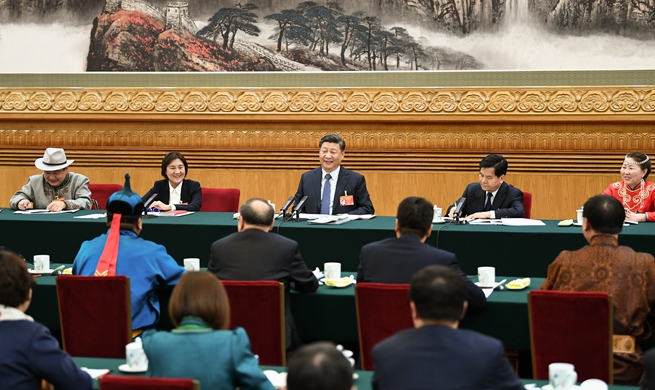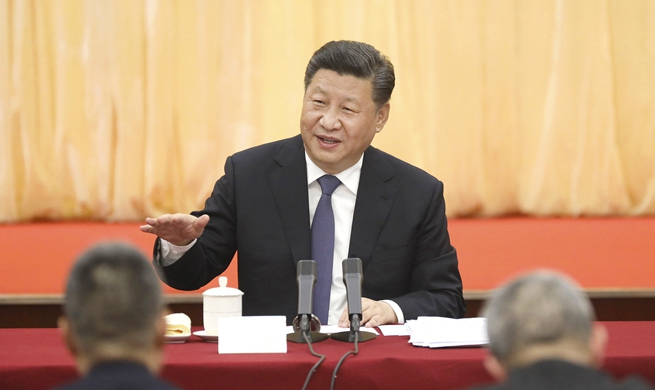BEIJING, March 7 (Xinhua) -- More Chinese players have joined in a global coalition to end the online illegal wildlife trade, pledging to contribute new technologies and greater social influences to efforts against poaching and trafficking of endangered species worldwide.
Eight IT companies from China, Tanzania and Vietnam became the latest members of the Coalition to End Wildlife Trafficking Online, a global network of e-commerce, technology and social media companies, as the coalition celebrated its first anniversary in Beijing on Wednesday.
The eight newly-joined members are Sina Weibo, artron.net, Sogou Search, Han Tang Collection, gucn.com, Gui You Tian Xia from China, Kupatana from Tanzania, and Sapo from Vietnam.
"Wildlife crime ranks among the most serious, dangerous and damaging international organized crimes along with human trafficking, drug running and illegal arms sales," said Jason Bell, IFAW's Vice President for Conservation and Animal Welfare, one of the organizers of the coalition.
In recent years, the purchase and sales of illegal wildlife products have shifted gradually from the traditional offline arena to online platforms and social media, which can facilitate secret transactions with the Internet providing global connectivity, user anonymity and rapid transport, he said.
Illegally trading endangered wildlife online is a new global challenge which require collaborations from governments, related business and all aspects of society to reduce and eliminate online illegal information in order to combat wildlife cybercrime, said Wu Zhimin, director of the wildlife protection department of National Forestry and Grassland Administration.
New technologies including image recognition, big data, machine learning and artificial intelligence give Chinese IT companies the edge to play a crucial role in the cause.
The Chinese coalition members deleted roughly 1 million pieces of information and automatically blocked over 10 million advertisements regarding illegal wildlife products, while 350,000 accounts involved in wildlife traffic were eliminated, according to WWF China.
"With the growing of e-commerce and social media platforms, the Chinese Internet industry has become an important force in combating cybercrime and conserving endangered wildlife in China and even at global scale," Wu said.
On March 7, 2018, 21 internet companies from North America, Asia, and Africa, alongside non-profit organizations WWF, IFAW, and TRAFFIC initiated the coalition in San Francisco.
Since the establishment of the coalition, leading IT companies including Alibaba, Baidu and Tencent from China as their international partners Microsoft, Google, eBay, Instagram, among others, have been actively implementing wildlife friendly policies and exploring new applications to detect and eliminate illegal online information, said Zhou Fei, chief programe officer of WWF China.
Members of the coalition supported law enforcement efforts, participated in multi-agency coordination, and enhanced users' awareness of protecting wildlife and refusing to consume illegal wildlife products, he said.
In November last year, a transnational wildlife traffic ring was cracked by the Chinese Forest Police in the central province of Hunan with 129 suspects arrested. A total of 216 endangered pangolins among other wildlife products and 18 million yuan (2.68 million U.S. dollars) of illicit funds were confiscated at the site.
A coalition member company assisted the law enforcement to root out the criminal organization by monitoring the illegal sales channels, according to WWF China.
Meanwhile, social media platforms have been increasing efforts and innovating campaigning methods to promote the building of an ecological civilization and advise netizens against wildlife consumption to reduce the demand, said Xiao Wenhao with Baidu.
For example, if the reporter searched for "ivory" on Taobao, a retail platform under Alibaba Group, an image of an African elephant was shown with a footnote saying, "Illegal ivory trade has pushed elephants towards extinction" and tips for how to report an illegal product to Taobao administrators.
In January, a creative art exhibition showing exquisite miniature carvings on walnut shells was organized in Chengdu by an e-commerce website specialized in antiques and relics under the theme of "Cultural values without the toll of life."
The wwtx website, also a coalition member, sent out the message to its over 1.5 million users by highlighting the potential market value of walnut carvings as a more eco-friendly and sustainable future for the traditional techniques that had been done on ivory or rhino horn.
The coalition facilitate Chinese Internet companies to link with other countries' counterparts and demonstrate how they are delivering their corporate social responsibility. Organizers will support members to continually create and disseminate messages regarding wildlife protection to target audiences in a variety of ways, Zhou Fei said.
"The coalition has set an ambitious, yet bold goal of working to reduce wildlife trafficking online by 80 percent by 2020. Every effort should be made to support this goal and it is only through partnership and, collective and coordinated action on the part of the coalition, that we will be successful," Bell said.















